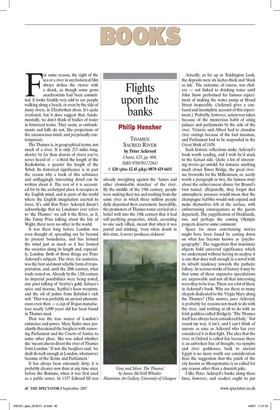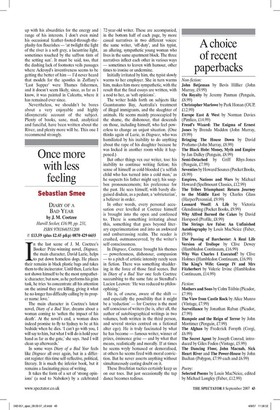Flights upon the banks
Philip Hensher THAMES: SACRED RIVER by Peter Ackroyd Chatto, £25, pp. 608, ISBN 9780701172843 © £20 (plus £2.45 p&p) 0870 429 6655 For some reason, the sight of the sea or a river in any historical film always strikes the viewer with a shock, as though some gross anachronism had been committed. It looks frankly very odd to see people walking along a beach, or even by the side of many rivers, in Elizabethan dress. It's quite irrational, but it does suggest that, fundamentally, we don't think of bodies of water in historical terms. They seem, as embankments and hills do not, like projections of the unconscious mind, and perpetually contemporary.
The Thames is, in geographical terms, not much of a river. It is only 215 miles long, shorter by far than dozens of rivers you've never heard of — a third the length of the Kuskokwim, a quarter the length of the Tobol. Its historical significance is in part the reason why a book of this substance and unflaggingly interesting detail can be written about it. The rest of it is accounted for by the archetypal place it occupies in the English mind, and in parts of the world where the English imagination exerted its force. It's odd that Peter Ackroyd doesn't acknowledge that no Londoner ever refers to 'the Thames': we call it the River, as if, like Fanny Price talking about the Isle of Wight, there were no other in the world.
It was there long before London was even thought of, spreading out far beyond its present boundaries, and has formed the mind just as much as it has formed the societies along its length and, especially, London. Both of those things are Peter Ackroyd's subjects. The river, for centuries, was the best and most reliable form of transportation, and, until the 20th century, what trade rested on. Already by the 12th century its imperial possibilities were being noted, one poet talking of 'Arabia's gold, Sabaea's spice and incense, Scythia's keen weapons, and the oil of palms from Babylon's rich soil.' That was probably an ancient phenomenon even then — a cup of Trojan manufacture nearly 3,000 years old has been found in Thames mud.
That was the true source of London's eminence and power. Mary Tudor once petulantly threatened the burghers with removing Parliament and the Courts of Justice to some other place. She was asked whether she 'meant also to divert the river of Thames from London.' If not, the burghers said, 'we shall do well enough at London, whatsoever become of the Terme and Parliament.'
It has always been extremely dirty; it is probably cleaner now than at any time since before the Romans, when it was first used as a public sewer. In 1357 Edward III was already inveighing against the 'fumes and other abominable stenches' of the river. By the middle of the 19th century, people were making their tea and washing from the same river in which three million people daily deposited their excrement. Incredibly, the promoters of Thames water carried on a belief well into the 19th century that it had self-purifying properties, which, according to one such villain, meant that when it was putrid and stinking, 'even when drunk in this state, it never produces sickness'.
Actually, as far up as Teddington Lock, the deposits were six inches thick and 'black as ink'. The outcome, of course, was cholera — not linked to drinking water until John Snow performed his famous experiment of making the water pump at Broad Street inoperable. (Ackroyd gives a confused and incomplete account of this experiment.) Probably, however, action was taken because of the mysterious habit of siting palaces and parliaments by the side of the river. Victoria and Albert had to abandon river outings because of the foul miasmas, and Parliament had to be suspended in the Great Stink of 1858.
Such historic reflections make Ackroyd's book worth reading, and I wish he'd stuck to the factual side. Quite a lot of interesting stories go untold; for instance anything much about Tower Bridge, the great riverMe fireworks for the Millennium, or, surely worth a paragraph or two, the famous story about the subterranean dinner for Brunel's foot tunnel. (Reputedly, they forgot that atmospheric pressure would mean that the champagne bubbles would only expand and make themselves felt at the surface, with embarrassing consequences as the guests departed). The yuppification of Docklands, too, and perhaps the coming Olympic projects deserve some comment.
Space for more entertaining stories might have been found by cutting down on what has become known as 'psychogeography'. The suggestion that inanimate objects hold universal significance which we understand without having to analyse it is one that does well enough in a novel with its inbuilt tendency towards the pathetic fallacy. In serious works of history it may be that some of these expansive speculations are unprovable and not all that interesting were they to be true. There are a lot of these in Ackroyd's book. Why are there so many chapels dedicated to the Virgin Mary along the Thames? (The answer, pace Ackroyd, is probably for reasons not much to do with the river, and nothing at all to do with an Irish goddess called Bridget). 'The Thames itself has always been considered holy.' Not round my way, it isn't, and I can't think of anyone as sane as Ackroyd who has ever considered it in that light. The idea that the river at Oxford is called Isis because there is an unbroken line of thought, via nymphs and river goddesses, back to ancient Egypt is no more worth our consideration than the suggestion that the patch of the city known as Mesopotamia is so called for any reason other than a donnish joke.
I like Peter Ackroyd's books along these lines, however, and readers ought to put up with his absurdities for the energy and range of his interests. I don't even mind his occasional feather-footed-through-theplashy-fen flourishes — 'at twilight the light of the river is a soft grey, a lacustrine light, sometimes touched by the saffron tints of the setting sun'. It must be said, too, that the dashing lack of footnotes veils passages where Ackroyd's inventiveness seems to be getting the better of him — I'd never heard that models for the apostles in Zoffany's 'Last Supper' were Thames fishermen, and it doesn't seem likely, since, as far as I know, it was painted in Calcutta, where it has remained ever since.
Nevertheless, we shouldn't be bores about a very enjoyable and highly idiosyncratic account of the subject. Plenty of books, sane, mad, analytical and fanciful, have been written about the River, and plenty more will be. This one I recommend strongly.




































































 Previous page
Previous page